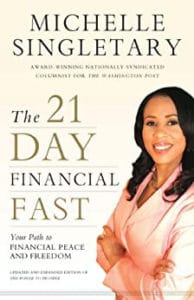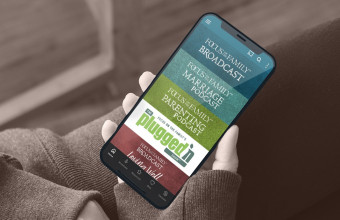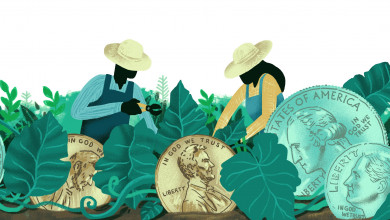
The War of Words
In this Adventures in Odyssey drama, a carelessly uttered word from Eugene creates havoc as it becomes the fashionable insult, resulting in a lesson about the power of words.
Home » Episodes » Focus on the Family Broadcast » Fasting for a Financially Fit Future (Part 1 of 2)
Preview:
Michelle Singletary: You know, I think initially they have to have a plan, so I would say, “Get an index card.” It sounds so simple. Get an index card and write down your number one financial goal. It doesn’t matter if you have enough money or you even think you gonna have enough, just write down that goal. It could be to pay off my house before I retire, or to send my kids to college, or to save enough for one month’s emergency, uh, and then write that on the card, and let that be the beginning of saving for you.
End of Preview
John Fuller: Michelle Singletary is a personal finance columnist for the Washington Post, and she has a good word of advice for the person who’s living paycheck to paycheck. Well, it sounds kinda simple, doesn’t it? Michelle Singletary has some great insights for you, even if you think, “I can’t get there.” She’ll offer ways you can on today’s episode of Focus on the Family. Your host is Focus president and author, Jim Daly. I’m John Fuller, and Jim, for so many families and so many individuals, uh, it can sure feel like the money comes in and the money goes right back out.
Jim Daly: Well, it does, especially with inflation. Sometimes I’m shocked when I’m paying the bills, car insurance, medical bills, gas bills. The- the costs just go on and on, right?
John: Mm-hmm.
Jim: And, those things keep going up. It’s hard to, uh, keep up with it, and whether you have a lot of money or a little, it’s a huge point of stress. Uh, conflicts about money are one of the top contributors to marital strife, and maybe we’ll uncover what’s behind that stress today.
John: And as I said, uh, Michelle Singletary writes for the Washington Post. She’s written a number of book, including The 21-Day Financial Fast, and we do have copies of that book here at focusonthefamily.com/broadcast or call 800, the letter A, and the word, FAMILY. Let’s go ahead and jump into the conversation with Michelle on today’s episode of Focus on the Family.
Jim: Well, Michelle, let me welcome you to Focus.
Michelle: Oh, thank you. I’m so honored. Oh my goodness, I’m so happy (laughs).
Jim: Oh, that’s kind of you. Now, you’re working full-time at the Washington Post, creating that column to help people with their money issues. What’s something that you see in that position, working with a broad spectrum of people, what do they say is causing them heartache?
Michelle: I think two major things, their inability to save and- and their debt load. Um, and it’s just weighing so heavily on folks, um, that they don’t see a way out, and they just, they do, they just throw their hands up, because they- they can’t save enough, uh, and then they can’t save enough because they have so much debt.
Jim: Now, are- are you, um… and I- I mean this sincerely… are you saying that when you look at a $130 energy bill per month, and you’re looking at a couple of hundred dollars on auto insurance, and you’re trying to pay your rent, which varies around the country, I get that, but even here in Colorado Springs, I mean, you’re paying maybe 1,400 to rent an apartment. Um, those are big expenses.
Michelle: It is.
Jim: Um, how do you get ahead when you’re, again, barely making it? I mean, it’s like you’re bringing in, uh, 3,000 a month, and you’re spending 3,000 a month-
Michelle: Right.
Jim: … on those essentials.
Michelle: Right. You know, I actually want to use an analogy. Uh, at our church, we have altar call every Sunday, and lots of people sit there, and they say to themselves, “I’m not ready to go. I’m not good enough to go,” and- and they- they delay it. Um, and it’s the same thing with your money. People think, “I just can’t do it,” and- and, absolutely, the bills are high. The rent is high. Energy is high, but you can’t wait till you’re ready to do it, just like you can’t wait ready to accept Christ, so you have to just leap out there. And, what does that mean? It means making different choices.
Jim: Mm-hmm.
Michelle: It may mean that you can’t live in that apartment by yourself. It may mean that your kid can’t go out of state for college. They have to go in state, and maybe they can’t even stay on campus. So, you- you have to know that you’ve got to make better choices, just like when you choose to accept Christ, you’ve got to make better choices, but you don’t come perfect, and it’s the same thing with your money, and I have to remove that from people that I can’t spare it. You’ve got to get rid of that, I can’t spare it, or you won’t be able to do it.
Jim: Do you think it’s fair to say that people live in categories? I hate to say that, but when you’re, uh, you know, just making enough to pay the bills, and then there’s th- those that have a little more discretionary income, and they’re making perhaps poor choices, and then even… You know, it’s so funny when you talk to financial experts, and I’m sure you’re right in there as a financial expert, you talk to people that make what seems like quite a bit of money, maybe six figures, a hundred thousand, maybe 150,000, they seem to be struggling, too.
Michelle: Yeah, everybody’s struggling (laughs), I tell you.
Jim: How does that happen? I somebody making $50,000-
Michelle: Right.
Jim: … a year would look at somebody making 150,000, and they’d say, “If I had that, I would be fine.” But you talk to those that have it, and they’re going, “We’re squeezed.”
Michelle: Right.
Jim: How does that happen?
Michelle: Because the more you make, the more you spend, and if you remember, all of us when we started out at our first job, we thought, “Oh my goodness, this is good money.” And then, as you start making more money, what did you start doing? You elevated your standard of living-
Jim: Mm-hmm, right.
Michelle: … so that you started to live up to what you make. You know, I was raised by my grandmother. We call her Big Mama, and-
Jim: Say that again, because there- there’s a snapper in there.
Michelle: My Big Mama.
Jim: Big mama.
Michelle: I was raised by my grandmother, who we called Big Mama. It’s… The funny thing is, she wasn’t a big woman at all (laughs).
Jim: Right, but big in your eyes (laughs).
Michelle: But big in my eyes. Um, and she made minimum wage-
Jim: Mm-hmm.
Michelle: … and she took in five of us. There was five grandchildren she took in, and I was one of the five. Um, and she made what we would consider, uh… I mean, she lived below the poverty line.
Jim: Yeah.
Michelle: And yet, my grandmother was able to save, and pay off her cars early, and when she retired, her home was paid off. And so, when I look at her, and I think, “Oh, she could do it.” Now mind you, she didn’t do it back in the ’40s. My grandmother, you know, passed away, um, in the early ’90s, so we’re not talking when, you know, bread was, uh, you know, five cents.
Jim: Right.
Michelle: Um, and I just look at her as the example, because she never elevated herself up to where her salary was.
Jim: Mm.
Michelle: Um, and so, you could be making $20,000 and still find something to save. You can be making $200,000, and you absolutely should be finding something to save. Uh, I work with people at all income levels, and it does astound me that people making six figures have less than people I know making 20 or $30,000 a year.
Jim: When some of those big decisions they make, uh, you know, ends up costing them a lot-
Michelle: Absolutely.
Jim: … because they’re buying bigger houses, bigger cars, and that trap-
Michelle: Right.
Jim: … if something falls apart, like their job-
Michelle: Right.
Jim: … they’re really in trouble. I do want to push you a little bit, Michelle, with Big Mama. I love that.
Michelle: (laughs)
Jim: This is so fun. Uh, in your book, The 21-Day Financial Fast, you reference though, um, kind of the residue of living and growing up in Big Mama’s house, because she was very thrifty-
Michelle: Yeah.
Jim: … and it made you, if I’m saying it correctly, uh, fearful of spending and being poor. Talk about that and how you manage that.
Michelle: Right. You know, I always describe my grandmother as a cross between a drill sergeant and a guardian angel. Uh, and so, the drill sergeant in her taught me how to handle money, amazingly so. I used to say that-
Jim: (laughs)
Michelle: … my grandmother could hold a penny and make Lincoln scream.
Jim: (laughs) A drill sergeant captures it.
Michelle: Yes, and you know, the guardian angel part of her was she showered down on me, though, however, was to be afraid. She was… Even though she was a great money manager, she was always afraid of something happening, and when you live at that level, losing your job is devastating, because you know you don’t… She had savings, but maybe not enough to raise five grandchildren, and so she did instill in me a fear, a fear of spending. Um, and so, even though I made, as I made more money, I, just, you cannot grip money out of my hands. I mean, I just, I- I- I hate spending. In fact, I tell people this, and they’re shocked. My husband is the family CFO, because if it was left up to me to pay anything, we would not, we would be running around buck naked.
Jim: (laughs)
Michelle: I’m- I’m- I’m being completely honest.
Jim: (laughs) You are, uh, pretty tight.
Michelle: (laughs) I’m really tight, and I had to learn, because I know that there are some folks out there who are good stewards over their money. I had to learn that it’s okay to spend if you have all your financial ducks in a row, which I do. It’s okay that when it comes time for your 15-year-old car, you know, even though it still runs, that it’s okay to get another car. And, guess what? You could actually even get a new car. You know, it’s okay to buy new shoes (laughs).
Jim: That’s good. I’m feeling good about my ’05 Highlander…which is what I drive every day. I got five more years out of that thing.
John: Easily.
Michelle: So, you know, we all have, uh, yokes to break, and, um, that’s why, that’s one of the reasons why I wrote the book. Um, and my yoke was fear.
Jim: Ah.
Michelle: You know, I always had this sort of bag lady syndrome, that I’d end up as a bag lady. Now, I’m a product of Big Mama. I would never be that woman, but I was also fearful. So, for me, I had to learn to be okay with the wealth that I’ve accumulated through the grace of God, and so that’s my yoke. Now, other folks have different yokes. Um, and some people may think, “Oh, that’s a great, you know, problem to have,” but you don’t want to be miserly, and I’m not miserly, um, but I always fight against that, and so, that’s the thing that I challenge myself to make sure. Um, and my husband and I are very generous, and we tithe, and- and so forth. But, you know, when I first started tithing, it was just like, “Oh, you know, am I gonna have money for food,” (laughs) which is crazy.
Jim: Well, yeah, no.
Michelle: Um, and I do, uh, and so, that’s what I’ve been struggling with, and I still struggle. I’m better. I’m better.
Jim: Well, let me ask you this. Before I do, we are gonna get there, to the-
John: The 21 Day Financial Fast. (laughing)
Jim: … The 21 Day Financial Fast. I want to talk to you about that, but, you know, um, when you’re coming from really tight resources, um, that was my mom. She was a single parent mom after she and my dad divorced. We lived in some bad neighborhoods. I went to third grade in Compton.
Michelle: Mm.
Jim: My point in saying all that, though, is just whether you’re coming from a, uh, poor White community, a poor African-American community, a poor Latino community, um, it doesn’t, race doesn’t matter. I experienced it. Uh, these things, these, uh, principles are important to embrace, but talk about that distinction. Sometimes, um, uh, we feel, um, the load is too much-
Michelle: Right.
Jim: … and we look for reasons as to why, and maybe opportunity isn’t quite the same for everybody. I don’t mind talking about that, too, but talk about, um, just the idea of the poor and what we need to be thinking about.
Michelle: You know, I’m glad you asked that question, because whenever I speak, there’s always someone who will stand up, you know, in a way of challenging me, “Well, you know, there’s a lot of poor people, so how can you tell them to save when they don’t have any money?” Well, what would you say, uh, I should tell them as an alternative?
Jim: Yeah, mm.
Michelle: Because no matter what you earn, you got to figure out a way to live within that means. Now, I have different messages where I try to help them get a better education and- and better skill-building, um, and I always think it about it like Paul. You know, Paul said, “I have learned to live when I don’t have a lot and when I have a lot,” and that message resonates whether you are poor or wealthy, and that’s the message I try to give out to folks. Listen, I know what it’s like to be poor. I know what it’s like to actually be hungry, and so, I know what they’re going through. I went through it. I was raised with it, but I also know that I had a grandmother who had a minimum wage job, five grandchildren. She did not take welfare and still was able to save and feed us, and maybe we didn’t have enough for seconds, so you had to hover over your food. (laughing)…in case somebody, ’cause I’m a very slow eater-
Jim: Oh.
Michelle: … and so, you know, if you didn’t hover over your food, someone’s gonna slip (laughs) your chicken off your plate.(laughing)
Jim: I know that feeling. (laughing)
Michelle: So I know. So, we had enough, maybe not, uh, you know, an abundance, but she always had food on our table and clothes on our, uh, backs. Maybe we didn’t have two pairs of shoes, but we had a pair of shoes.
Jim: Right.
Michelle: So I know where you’re coming from, and now that I’m living better, I don’t talk from the advantage of someone who grew up with a silver spoon.
Jim: Right.
Michelle: And so, uh, it’s so funny, ’cause whenever I talk to people, it’s like I’m like the poster child for every possible demographic there is. I’m African-American. I’m woman. I’m married. I grew up poor. I’m wealthy now (laughs), you know.
Jim: Right.
Michelle: My son has autism, so I know what it’s like to live with a disability. I had a disability. I had to, you know, help my grandmother in her later years. She was dying. I’ve been a caretaker, um, because my brother had… My, one of my brothers had epilepsy, so I had to take care of him, both physically and financially. When I graduated from college, my grandmother turned over the care of him to me.
Jim: Mm, oh my goodness.
Michelle: And I had to take care of him until he passed away in his early 30s from a massive seizure. So, I cross every (laughs) possible, you know, demographic, and so, I- I completely understand what everyone says.
Jim: Mm.
Michelle: Uh, and so, I think the message has to be both personal responsibility, but also compassion-
Jim: Right.
Michelle: … and- and while they are helping themselves, we need to put things in place to help them.
Jim: Right.
Michelle: And then, I speak to middle income and upper income and wealthy, um, because, you know, if you’re wealthy, you need to- to be giving back. I mean, there are lots of families in this country who are doing well for themselves, but I use the example of Joseph, um, not Jesus’s father, but Joseph from Genesis, um, who saved. You know, and I always thought of that story as a financial story. People think of it as, you know, living your dream and following God. I, it’s a financial story, because if he had not saved during the time of plenty, his father wouldn’t have told his brothers, “Hey, they’ve got extra stuff up there in Egypt. Why don’t go get it, ’cause we’re starving back here?” Had they not done that, had he not saved during a time when he had it, they wouldn’t have come-
Jim: Mm.
Michelle: … they wouldn’t have been reunited (laughs), you know, and we wouldn’t have had the Joseph story.
Jim: Yeah.
Michelle: Um, and so, that’s what I tell those families, “Listen, you’ve got enough for yourself, but you oughta have more. You need to save for just, not just for your family, but your extended family, for your community, and for the world.”
Jim: I- I love that. I mean, you, that right there, you just said so much that, uh, is worth talking more deeply about. Um, we do get this out of balance, don’t we? We tend to lean one direction or the other direction, and then it creates political battles-
Michelle: Right.
Jim: … when it doesn’t really need to be there. Um, I like that idea of maintaining generosity while teaching, um, self-control-
Michelle: Right.
Jim: … and responsibility and those things. Um, Michelle Singletary, our guest today on Focus on the Family with her book, The 21-Day Financial Fast. I think we’ve set it up. Now, let’s talk about it. (laughing) Um, uh, where did you connect with this idea about fasting and applying it to your money?
Michelle: Wow. Um, well, at my church, and I belong to First Baptist Church of Glenarden, Maryland, and the pastor is John K. Jenkins, Sr., wonderful, uh, teaching pastor.
Jim: I love that.
Michelle: Um, and so a lot of the ministers at our church at the beginning of the year do the Daniel Fast, and for those who are not familiar with the Daniel Fast, you, basically, fast from meats, and sweets and artificial anything, and it’s just fruits and vegetables. It’s just a healthy way, and then during the fast you’re looking to God, you’re praying. You’re kind of recentering yourself, and you’re getting rid of yokes and things that you have, things that tug on your life that you should get rid of. So, every year we do it at the beginning of the year, and about halfway through, I was, I’ll be honest, I was struggling.
Jim: How long do you go?
Michelle: You, it’s 21 days.
Jim: Okay.
Michelle: And I needed some meat (laughs) halfway through.
Jim: You were tired of fasting.
Michelle: I was tired of fasting (laughs).
Jim: Fruits and vegetables were getting thin.
Michelle: Yeah (laughs), and I’m getting thin. You know, how many potatoes can you eat, you know. (laughing) And I was thinking about how much I was thinking about food, and how much I was thinking, “You know what? This is really healthier, um, and I’m okay,” even though I was joking about it, you know, and it’s a balance, right, and that once I came off the fast, I wanted to be sure to keep the focus on vegetables and healthy e- eating. And during it, I thought, “I wonder if I could do something similar with people and their money? What if I had them fast from unnecessary spending and credit and plastic, so that you completely shut it down?” Because when you shut something down, you start to really sort of think about what you’ve been doing with your life. In one case it was food, but in another case, money. You know, so when you’re not… ‘Cause we are always unconsciously thinking about spending, and not even realizing it, which is, uh, what unconscious means. And so, we’re, you know, going out and getting coffee, or getting a bun, or getting chips, or, you know, whatever it is. And, uh, we’re running taking our kids to stuff, and so we don’t think to pack the stuff so that they can eat healthy, we’re just going to fast food, ’cause we’re on a rush, and we can’t, we don’t have time to think about money and what this is costing us. And so, for 21 days, you get shut down from all of that. Now, people will sort of joke, “You know, well, do I pay my rent and stuff?” And, no, that’s crazy. Right, I’m gonna, uh, invent a fast where you don’t pay your bills (laughs), you know?
Jim: Right, that’s not… That’s called, go to jail.
Michelle: No, so you pay all your bills, including your credit card bills. You pay your rent, your mortgage, your cellphone and everything. What you don’t do is no unnecessary spending, and even grocery stores, because lots of people have issues. They overspend at the grocery store. Um, and so you have to have a tight grocery budget, and you can only use cash-
Jim: Mm.
Michelle: … because the thing about cash, because people think, you know, debit is sort of the new cash, people think, but a debit card is not the same as cash, because here’s the thing. There are studies that show that when you use plastic, debit or credit, you spend more than if you had cash. So, if you had to go to the grocery store, most of us take multiple runs during the week, and all those runs, mostly to fill, you know, milk and vegetables, right? That’s what we say. So, we go in. We just need a gallon of milk, and some eggs and some veggies, and what-
Jim: Don’t forget that ice cream.
Michelle: … and, wow. See, there you go.
Jim: (laughs) There you go, I know.
John: Dairy product, so it must be- (laughs).
Michelle: Right there. So, you go in with like three things on your list. You come out with 20 things on your list.
Jim: Mm-hmm.
Michelle: And if you only had $20, you could only buy those three things, but because you have a debit card, because you have a credit card, you can overspend. And so, I want you to get acquainted with limitations, and so the fast is to shut it down, limitations, limitations, limitations. And so, and then, credit, obviously, to get you starting to think about debt, and people think, “Oh, it’s easy. I could that for 21 days.” About day three, I start getting emails from people like, “You are crazy. I can’t work.” You know, because we just, we just spend so much-
Jim: Mm-hmm.
Michelle: … and we don’t prioritize our spending, and I hear people talk about how, you know, uh, one woman said day three, she stopped smoking, because she realized how much she was spending on cigarettes, which is an enormously expensive habit. I mean, people will think, “I didn’t realize how much I was spending eating out for lunch.” Now here’s the thing. Most financial experts will say, “You know, cut out the expensive coffee. Cut out this, ’cause you’ll save millions,” which is, really, the math doesn’t work. Um, I don’t tell you any of that, because here’s the difference with me. You decide what is important for your budget, and if getting that expensive, nicely-brewed coffee in the morning is what you like, and it will keep you, if you don’t mind, from slapping your co-workers, ’cause, you know (laughing) … we got some. (laughing) I know-
Jim: (laughs) Definitely get that coffee then (laughs).
Michelle: Exactly, get that coffee. But here’s the thing, you can’t get the coffee, and eat out at your lunch, and buy all the clothes, and buy the car, and send your kids to this and da-da-da-da. You can’t do it all. Even Bill Gates, one of the richest men in America, could go broke, because you’ve got to put, uh, limits on it. So, the fast helps you shut… When you shut down everything, when it comes time to reboot, you have now figured out what really matters to you. Hey, I really like that coffee, but you know what? I can make my lunch. That’s what the fast does.
Jim: You’ve got some trade-offs, and, man, you are going, and I want to go (laughing) … I got (laughing) No, it’s good, ’cause I want to take you back to something you said. My mind is right there with limiting the amount of cash you take to the grocery store-
John: Mm.
Jim: … uh, I- I think is what you’re implying.
Michelle: Right.
Jim: I’d never thought about that, ’cause I just, you know, guys, and women, too, purses and wallets. We have plastic. We’ve got, even cash we’ve got in there, but if I said to myself, “I just need these four things,” and then take just that amount of cash, roughly kind of calculate it, four bucks for milk, whatever else, and just put that much cash and don’t spend the credit card, that does give you the discipline.
Michelle: Absolutely. That’s exactly what I’m talking about. And when I say, cash, people freak out, “Well, what do you mean? I got to walk around with thousands of dollars?” Seriously? We, that’s how we think these days. No, you take out just enough that you need for that day or that week-
Jim: Mm.
Michelle: … uh, and you only take that, and the thing is, we gotta get rid of this. I mean, think about it now. They have set up credit and plastic debit so it’s so easy that you don’t remember… I mean, I’m kind of dating myself… remember how they had to pull out the machine, and they had to put the card in it, slide it-
Jim: Yeah, yeah.
Michelle: … you know, and it took about five or 10 minutes.
Jim: Yeah.
Michelle: Now, you can walk past machines with your keys and pay for stuff.
Jim: And just flash the card.
Michelle: We- we can flash our phones and pay something, and it’s not done without thought, because they have people who study how to reduce the amount of time it takes for you to pay for stuff. So, if it’s really quick, you’re not making that calculation in your mind, “Hey, this is kind of expensive.” If we had to pay cash for our cars, most of us would be driving Ford Focuses. (laughing)
Jim: Ford Focuses, they’re relatively cheap.
Michelle: Relatively cheap, because if you had to lay out all that money-
Jim: Mm-hmm.
Michelle: … you know, like just take big screen TVs. Uh, you know, you could get a big screen TV for, uh, 2,000 maybe, a nice one, 3,000. If you had to go to the store and hand out those hundred-dollar bills, probably about $500, you’re thinking, “I don’t really need this TV.” Um, and I’m not saying, “Don’t get the big screen TV.” I’m just saying, “We need to think about how much we are spending before we spend it.”
Jim: Let me ask you this then. With, uh, the 20, 30-somethings, uh, is this more of a problem, because they’re more inclined to use technology to pay their bills? Sometimes my kids will laugh at me, that I’m writing a check.
Michelle: Right.
Jim: Uh, they go, “You don’t have to write a check.” (laughing) We had that the other day. We went to deposit a check at the bank, and Jean (laughs) said, it was one of those young women talking to an older woman moment-
Michelle: (laughs)
Jim: … and she’s going, “You know, you can just take a photo of that check and deposit it straight to us with a photo from your house?” And Jean’s like, “I felt like I was so old.” (laughing) She said, “Can you really do that?” And the woman said, “Yeah, that’s the way most people do it now.” (laughing)
Michelle: That is so funny.
Jim: But that- that does prove the point. There’s so much technology, 20, 30-somethings are so into it. Does it reduce their ability to say, no? Are you seeing more of a need for financial counseling within that community than perhaps an older community that did it the old-fashioned way?
Michelle: You know, honestly, no.
John: Ah-ha.
Michelle: (laughs) I see, uh, financial illiteracy and inability to handle money from people who are 15 to people who are 100 (laughs), you know. I mean, well, maybe out of 90, I think is the oldest I’ve actually helped counsel. Um, no, I think it’s not the age. It’s our society.
Jim: Mm.
Michelle: And so, I see young folks who- who are good with their money. I see young folks who are not good with their money. I see middle-aged folks who are awful with their money and who are good with their money. I’m seeing it across the board.
Jim: Mm.
Michelle: Uh, and my challenge is to get rid of those messages that they have to overspend.
Jim: Well, what I’d like to do is come back next time. You talk about an acronym, PAY, and I want to start next time with that, but tell us now what PAY means.
Michelle: So, what I try to do is build in things to help people join the fast, um, and so you want to start out by praying about what you want, uh, because oftentimes we think we want something, and we really aren’t doing what it takes to get that, and I, uh, every beginning, ’cause you read one chapter a day, and so at the beginning of each day and each chapter, I want you to pray and ask, “What is God’s will for your life when it comes to your finances?” And then, act. At the end of every chapter every day, there’s an assignment that I give you, because, you know, sometimes as Christians, sometimes, you know, we go, “Oh, the Lord gonna make a way.” Well, you know, he’s gonna make a way if you help him. (laughing) You know, I mean, I like, though, when they talk about the whole armor of God, when it says, “When you’ve all that you can,” right-
Jim: Mm-hmm.
Michelle: … “then you stand.” See, people forget that first part. When you’ve done all that you can, then you stand, ’cause God’s got, he’s got your back, but there’re some things that you have to do. Um, and so, you got to act. So, for example, I think day seven, when I talk about budgeting, you actually have to do a budget (laughs). You know, you actually have to save (laughs). You know, ’cause in, you know, Proverbs, it talks about the ants and how they work all year round to store up, while everybody, the grasshopper, everybody’s having a good old time during the summer, and they’re like, “You know, look, winter’s gonna come, and we gotta make sure we have stored…” Same thing, so you gotta pray, and you have to act, um, and then, yield, because what is God asking you to do? And here’s the thing about that yielding, ’cause lots of times I, when I go to forums, people talk about entrepreneurship, for example, as if everybody should be an entrepreneur. I believe in entrepreneurship, but not for everybody, because maybe God’s will is for you to be a teacher.
Jim: Mm.
Michelle: Maybe God’s will is for you to be a bus driver. Maybe God’s will is for you to be a counselor, and so you’ve got to figure out where you’re supposed to be and then you handle your money accordingly. For example, my daughter, uh, wants to be a teacher. She wants to be in education, so what’s the first thing people say when someone wants to be a teacher?
Jim: How can you afford to do that?
Michelle: Right. But you know what? The people who made the biggest difference in my life were educators, so I am not going to discourage my child from being an educator because she may not earn six figures. What I’m gonna do is teach my child to pray, to act, and to yield, and so that she will have enough money for what she wants to do in life.
Jim: Mm.
Michelle: And so, that’s what PAY is all about.
Jim: Uh, that’s good. Michelle Singletary, author of the book, The 21-Day Financial Fast, uh, let’s pick it up next time. I’ve got some more, hopefully, hard questions for you.
Michelle: (laughs)
Jim: And, uh, can you stick with us?
Michelle: I sure can.
Jim: All right. Let’s do it.
John: What a fun, engaging conversation with Michelle Singletary, and I do hope you’ve been, uh, inspired by her idea of a 21-day financial fast, uh, to get your money situation in order. Get a copy of that book by Michelle and follow the outline on how to do that. Um, you’ll find the daily challenges and journal prompts are a great roadmap for saving, and getting out of debt, and making your financial goals a reality. Get your copy of that book, The 21-Day Financial Fast and a CD or instant download of this conversation at focusonthefamily.com/broadcast. And, Michelle talked about generosity and the importance of giving to your local church and other, uh, important organizations. I trust Focus on the Family is one of those organizations that, uh, you consider worthy of your support. Every day we come into work, um, ready to come alongside millions of folks, worldwide, like you, who are looking for Biblical, trusted advice, and we need your help to continue in that mission. I’ll invite you today to make a difference in the lives of others by joining our support team, and you can donate today when you call 800-A-FAMILY, 800-232-6459 or visit focusonthefamily.com/broadcast. And, when you contribute a gift of any amount today, we’ll send a copy of The 21-Day Financial Fast as our way of saying, “Thanks for being a part of the team.” On behalf of Jim Daly and the entire Focus on the Family staff, thanks for joining us today. I’m John Fuller, inviting you back as we once again help you and your family thrive in Christ.

Michelle Singletary is a nationally recognized finance expert and a syndicated columnist for The Washington Post. Her award-winning column “The Color of Money” is carried in dozens of newspapers across the nation and was nominated for a Pulitzer Prize. Michelle has made guest appearances on many television shows including NBC’s Today Show, CBS’ The Early Show and ABC’s The View. She has authored three books: The 21 Day Financial Fast, Spend Well, Live Rich and Your Money and Your Man. Michelle and her husband have three children and reside in Maryland. Learn more about Michelle by visiting her website, michellesingletary.com.

Receive Michelle Singletary's book The 21-Day Financial Fast for your donation of any amount!

Visit our online store and purchase a CD of today's program for yourself or to share with a friend.

Listen to the Focus on the Family Broadcast, discover more podcasts, and find help for your family at your fingertips.

Find Focus on the Family broadcasts, best-in-class books, referral recommendations, and more.

Focus on the Family's staff of licensed, professional counselors can help you bring healing and restoration to your family with Christian perspectives you can trust.

We take nothing with us when we leave this world – none of our wealth or the stuff we buy or the things we invest our time and talents in. Until then, we are charged with looking after what God gives us here on earth.

As Russ grew in his understanding of God's perspective on tithes and offerings, he realized there are powerful reasons to give.

Money and marriage. A recipe for disaster or a chance at growth? Shaunti and Jeff Feldhahn share ways for couples to succeed financially and relationally.

Learn what to do to teach your kids about their finances, your giving of allowances and more.

If your money situation has reached the point where you find yourself sweating the arrival of each new batch of bills, there's no time like the present to take things firmly in hand.

Tommy Brown offers insights from his book, The Seven Money Types. He outlines those seven types, unpacking their strengths and weaknesses, and offers couples advice for working through their financial disagreements. (Part 1 of 2)

In this Adventures in Odyssey drama, a carelessly uttered word from Eugene creates havoc as it becomes the fashionable insult, resulting in a lesson about the power of words.

This discussion offers a preview of Volume #16 “Cultures in Conflict” from the That The World May Know video series, available below.

Debra Fileta will help couples better understand the four seasons of healthy relationships, what to expect during each one, and how to carefully navigate them for a stronger marriage. (Part 1 of 2)

Larnelle Harris shares stories about how God redeemed the dysfunctional past of his parents, the many African-American teachers who sacrificed their time and energy to give young men like himself a better future, and how his faithfulness to godly principles gave him greater opportunities and career success than anything else.

Amy Carroll shares how her perfectionism led to her being discontent in her marriage for over a decade, how she learned to find value in who Christ is, not in what she does, and practical ways everyone can accept the messiness of marriage and of life.

Pastor Dave Carder offers couples practical advice for protecting their marriages from adultery in a discussion based on his book Anatomy of an Affair: How Affairs, Attractions, and Addictions Develop, and How to Guard Your Marriage Against Them. (Part 1 of 2)